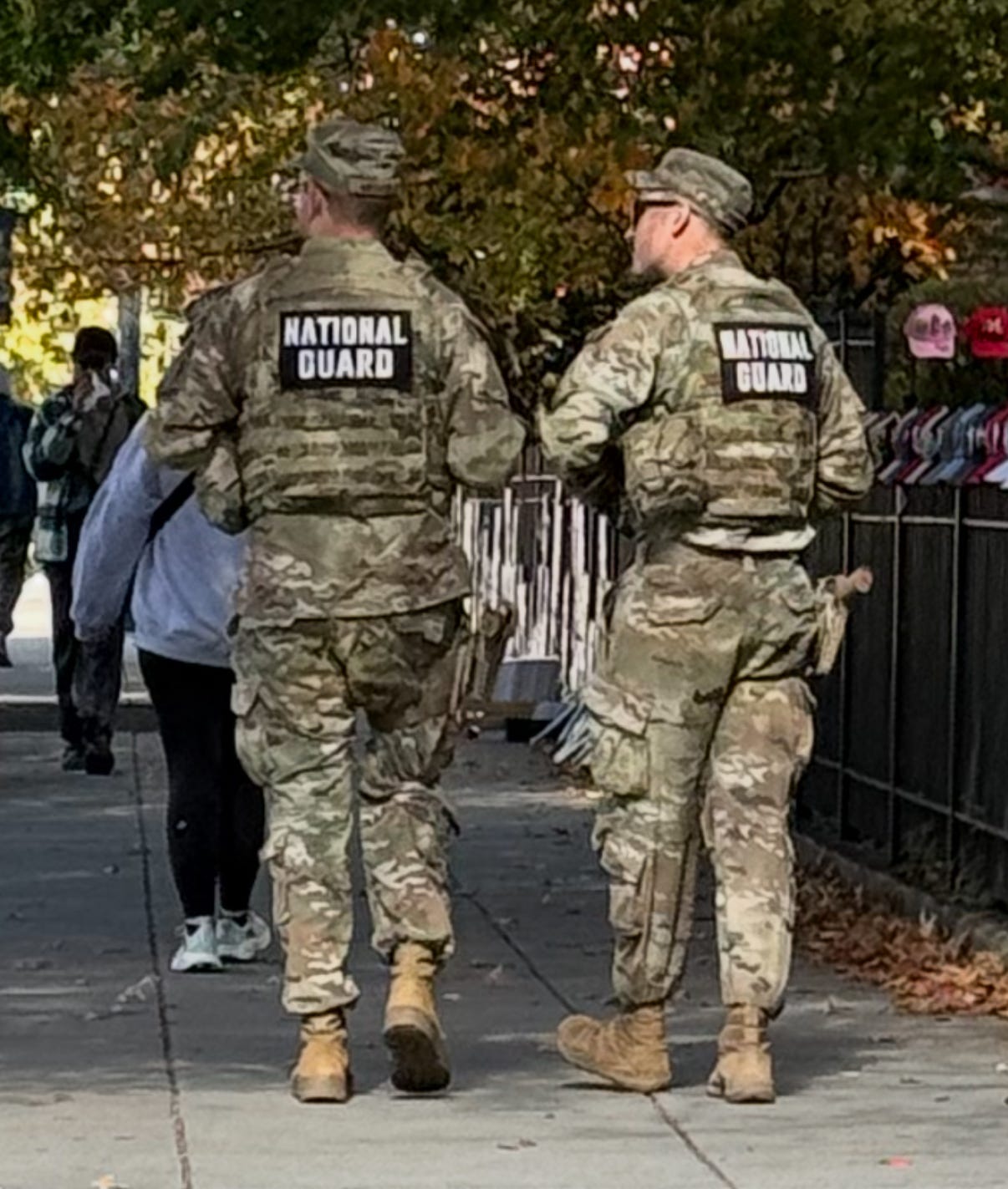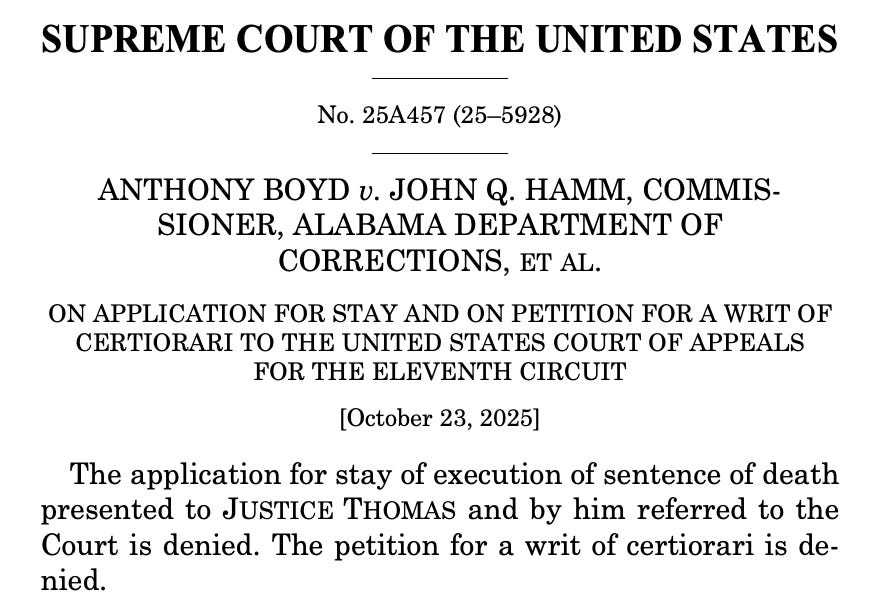A guide to what is happening in the challenges to Trump's National Guard deployment efforts
Expect significant rulings from the courts — including the Supreme Court — in the coming weeks. Also: The Supreme Court won't stop an eighth execution by nitrogen suffocation.

President Donald Trump, backed by several of his leading cabinet heads, wants members of the military in American cities.
Those efforts have been met with vociferous opposition and legal challenges. District court judges appointed by presidents of both parties — including by Trump himself — have reviewed the evidence and found the purported justifications offered up by the administration for the federalization and deployment of National Guard units to be insufficient. Four temporary restraining orders in three states have been issued thus far against the efforts, although two of those orders have been stayed pending appeal by the U.S. Court of Appeals for the Ninth Circuit. The Justice Department, meanwhile, is seeking to have the third TRO stayed by a district court and the fourth TRO stayed by the U.S. Supreme Court.
Although the Justice Department, led by Attorney General Pam Bondi, has defended Trump’s actions, and Homeland Security Secretary Kristi Noem and Defense Secretary Pete Hegseth have supported the efforts, those opposing these actions have framed this moment as fundamental to America’s history and future.
As Judge Ronald Gould, a Clinton appointee to the Ninth Circuit, wrote on Wednesday night of the question raised in this moment: “The democratic ideals our nation has consistently promoted for the last quarter millennium will be gravely undercut by allowing military force and weapons of war to be deployed against American citizens on U.S. soil on the flimsy grounds asserted here for this use of Executive power.”
What is happening, and where is it happening?
There are four major cases challenging federalization and/or deployment of National Guard and/or any members of the military. They are:
Newsom v. Trump (California) — TRO issued by U.S. District Judge Charles Breyer regarding 10 U.S.C. 12406, stayed by the Ninth Circuit pending DOJ’s appeal, en banc review of that stay denied; injunction issued by Breyer regarding the Posse Comitatus Act, administratively stayed at the Ninth Circuit
D.C. v. Trump — D.C.’s preliminary injunction request (on different grounds than is argued in state-based challenges) is pending, as is DOJ’s motion to dismiss the case
Oregon v. Trump — TRO issued by U.S. District Judge Karin Immergut regarding 12406 as to the federalization of the Oregon National Guard, stayed by the Ninth Circuit pending DOJ’s appeal, en banc review is being considered; second TRO issued by Immergut regarding 12406 as to deployment of any National Guard, DOJ’s motion to dissolve or stay this TRO is pending
Illinois v. Trump — TRO issued (and extended) by U.S. District Judge April Perry regarding 12406 as to any National Guard, stay denied by the U.S. Court of Appeals for the Seventh Circuit as to deployment, DOJ’s request to the U.S. Supreme Court is pending
Here is where things are happening:
U.S. Supreme Court: The only matter currently before the Supreme Court is the Illinois case, via the DOJ request on the shadow docket for a stay pending appeal. That has been fully briefed, so there could be a ruling on whether Perry’s order blocking deployment of National Guard troops in Illinois should be stayed while litigation is ongoing.
Seventh Circuit: The only matter before the Seventh Circuit currently is the appeal of the TRO in the Illinois case. I think what happens here will depend entirely on what happens at the Supreme Court.
Northern District of Illinois: Perry, a Biden appointee, will be considering the merits of this case, and — aside from the Supreme Court request — DOJ has agreed on Thursday to let the TRO be extended while the case proceeds to final judgment.
Ninth Circuit: Due to the 10 appointees Trump put on the appeals court in his first term, the 29-judge court can — particularly in its three-judge panels — veer far more rightward than many expect from its traditional “West Coast” reputation. That was seen here, where two different three-judge panels that included two Trump appointees granted stays of TROs pending appeal — in the California and Oregon cases.
In the California case, California sought en banc review of the stay pending appeal granted by Judges Mark Bennett (Trump), Eric Miller (Trump), and Jennifer Sung (Biden). That was denied on Wednesday night, over the objection of 11 judges on the court (including four senior judges). Gould’s dissent, quoted from above, was particularly harsh about the implications of these cases. The primary dissenting statement, authored by Judge Marsha Berzon for all 11 objecting judges, noted that some judges might not have supported en banc review of this order due to the “assuredly unusual“ procedural posture and the fact that there would be other options for en banc review coming soon enough, if necessary. Specifically, the order came out hours after the three-judge panel of Bennett, Miller, and Sung had heard arguments in the merits appeal over the TRO. The court was skeptical of DOJ’s arguments, as NBC News also reported, especially its arguments the would bar judicial review of the federalization and that would set not temporal limits on such federalization. (The appeal of the Posse Comitatus-related order remains pending as well.)
The full, 29-judge court is also considering whether to rehear a different panel’s decision to stay the district court’s TRO blocking the federalization of the Oregon National Guard. After that three-judge panel of Judges Susan Graber (Clinton), Ryan Nelson (Trump), and Bridget Bade (Trump) granted a stay over Graber’s dissent, a judge on the full court nearly immediately sought a vote on en banc review. DOJ opposes en banc review, while Oregon and Portland support it. (Late Wednesday, California — which joined the Oregon case after the initial TRO was appealed because the Trump administration sought to send federalized members of the California National Guard to Oregon — sought to intervene in the Oregon appeal at the Ninth Circuit and join its en banc request.) If the court grants en banc review in the Oregon case over the stay pending appeal request, which would consist of the chief judge and 10 other judges on the court, that “limited en banc” panel would be able to look at all of this without being held to the two Ninth Circuit panel orders issued in recent months.
District of Oregon: Immergut, a Trump appointee, is considering whether to dissolve or stay the second TRO she issued in the Oregon case, barring the Trump administration from deploying any National Guard in the state. DOJ, as well as the majority in the Oregon panel stay order out of the Ninth Circuit, argues that is the proper path in light of the stay of the first TRO. Oregon, as well as Graber, argue otherwise. Immergut has scheduled a hearing for 10 a.m. PT/1 p.m. ET Friday on the question.
Northern District of California: Breyer, a Clinton appointee, has multiple rulings on appeal. Although matters will eventually be back before him, there hasn’t been much going on in his courtroom recently.
District of the District of Columbia: U.S. District Judge Jia Cobb, a Biden appointee, will be hearing arguments starting an hour after Immergut’s hearing begins on Friday. At 2 p.m. ET, she will be hearing D.C. arguments that Trump’s ongoing National Guard deployment in D.C. is illegal and DOJ’s argument that the case should be dismissed.
There is a lot happening, but that’s the current — if a bit complicated — landscape.
As news happens on any of these fronts, Law Dork will report on it.
No words, just death
Over a sharp dissent from Justice Sonia Sotomayor, joined by Justices Elena Kagan and Ketanji Brown Jackson, the U.S. Supreme Court will not stop Alabama from killing Anthony Boyd tonight.
If the execution proceeds it will be Alabama’s fifth execution this year and the 40th execution in America in 2025.
Alabama recently began using nitrogen gas to suffocate people to death, starting with Kenneth Eugene Smith in January 2024. When the Supreme Court denied that stay of execution request, all three Democratic appointees would have kept Smith alive to raise his challenge. While Kagan, joined by Jackson, penned a brief, two-paragraph dissent in the case, Sotomayor issued a five-page dissent about the plans to use the “untested” method on a man the state had already failed to kill in one earlier botched execution. She concluded that dissent, “With deep sadness, but commitment to the Eighth Amendment’s protection against cruel and unusual punishment, I respectfully dissent.”
More than 20 months later, Sotomayor wrote again — with an even more direct dissent.
This time, Kagan and Jackson joined her.
Thursday’s dissent began by directly addressing her reader. Sotomayor told the reader to take out their phone’s stopwatch app and count out to four minutes.
“Now imagine for that entire time, you are suffocating,” she wrote.
Referencing that initial stay denial in Smith’s case, Sotomayor later wrote:
She then detailed the results of the first two of those executions, the alternatives to it, and the failure of the district court in Boyd’s case to find for him.
She concluded:
Allowing the nitrogen hypoxia experiment to continue despite mounting and unbroken evidence that it violates the Constitution by inflicting unnecessary suffering fails to “‘protec[t] [the] dignity’” of “‘the Nation we have been, the Nation we are, and the Nation we aspire to be.’” Smith, 601 U. S., at ___ (opinion of SOTOMAYOR, J.) (slip op., at 5) (quoting Hall v. Florida, 572 U. S. 701, 708 (2014)). Seven people have already been subjected to this cruel form of execution. The Court should not allow Boyd to become the eighth.
The Republican appointees allowing that to happen — Chief Justice John Roberts and Justices Clarence Thomas, Sam Alito, Neil Gorsuch, Brett Kavanaugh, and Amy Coney Barrett — wrote nothing.






A court increasingly bloodthirsty for American lives.
Wondering how “The Six” sleep at night…